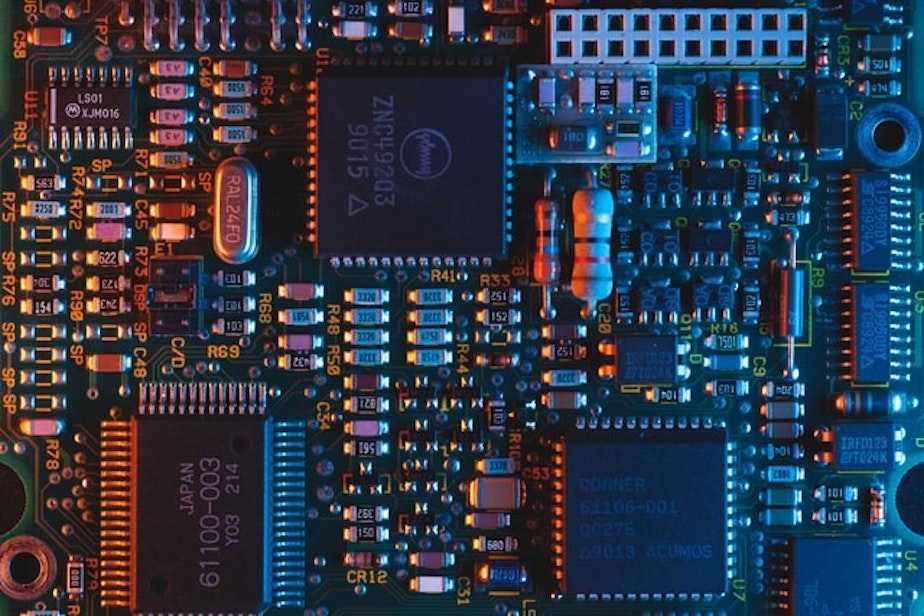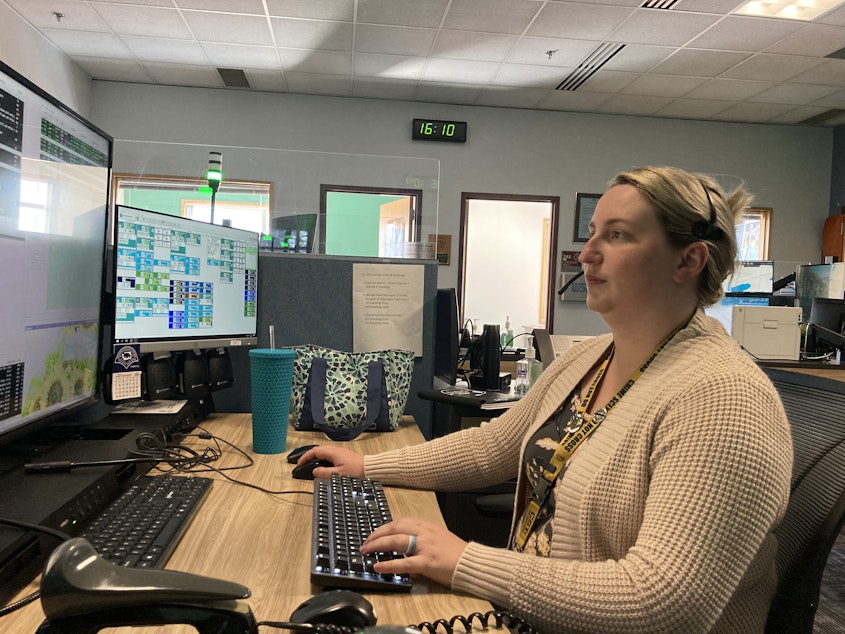CHIPS and dip: Today So Far

- You might not realize it, but the CHIPS Act is pretty exciting. But not everyone agrees with me.
- More monkeypox (MPV) vaccine has come to Washington state.
- Joe Kent takes the lead in the 3rd Congressional District; Herrera Beutler concedes.
This post originally appeared in KUOW's Today So Far newsletter for August 10, 2022.
I often say that the news stories most folks skip over are the most important ones. Maybe they seem boring on the surface. Maybe they don't have enough flair, ire, or drama. But in the end, you're affected. Well, buckle in for this one because President Biden just signed the CHIPS and Science Act!
Even that story I just linked above — they wrote about CHIPS against the backdrop of the raid on Trump's mansion. That's the equivalent of hiding a news pill in peanut butter. I'd argue that CHIPS is an investment in tech that has the potential to dip into our daily lives for generations to come — so it's more like CHIPS and dip.
This is essentially a $250 billion national investment in semiconductor manufacturing, among other technological capabilities (and has nothing to do with the 1980s TV show of the same name). The aim of CHIPS to make America more competitive with countries like China, which dominate microchip manufacturing. There has been a microchip shortage ever since the pandemic started, and that has hit us hard. For example, have you noticed that cars cost a lot more lately? That's partially because of a semiconductor shortage and cars use a lot of them.
If you're like my wife Nina, who wanted to reward herself for completing a two-year career training program with a new PS5, you've discovered that you can't find one anywhere — because there aren't enough microchips. If you care about new, renewable energy, then you should care about semiconductors. If you care about local, homegrown jobs, then you should care about semiconductors. Do you like working from home in your pajamas, making Zoom calls, and answering emails ... you get the idea.
Like I said, that's the aim of CHIPS, but I have a feeling it will have other outcomes. Think of it this way — we invested in the 1960s to go to the moon and now you make phone calls across the globe and watch endless channels of TV (thank you satellites). We invested in DARPA and now you're likely reading this on a smartphone that uses the internet (thank you DARPA). To try and list the influence of these technologies here would be exhausting. I have hope that further investment can benefit us in years to come, especially in a region like ours that has a potent space economy.
But not everybody sees things the way I do. There are critics. KUOW's Soundside just covered the range of perspectives on this. On one hand you have someone like Scott Keeney who founded nLIGHT, a semiconductor laser manufacturing company based in Washington. He's excited about the CHIPS Act because it means more jobs and business.
“Everything from your smart phone was manufactured by our lasers, NASA satellites are using our lasers to measure global warming changes — a wide range of applications,” Keeney said.
And then you have someone like Alan Sykes, professor of law at Stanford and "economist by training," who argues that CHIPS could cause the sector to go stale.
“You end up with inefficient, higher-cost production than you would if you would have let the market work on its own,” he said, adding that the government should keep its hands off such innovation and says that the U.S. already has a steady supply of semiconductors from Taiwan.
Sykes says that the CHIPS Act plays into protectionist rhetoric that rose during the Trump administration. Check out the full story on Soundside.
According to the most recent count, Washington state has about 223 cases of monkeypox, aka "MPV." A total of 85% of those cases are in King County. It's shown up in 12 counties, so far. Washington just got a new shipment of vaccine for MPV, which health officials are sending to Island, Kitsap, Pierce, Skagit, Snohomish, and Whatcom counties. Doses are not being distributed on a first-come, first-serve basis. Instead, officials have triaged the situation and are targeting those who are most at risk. Read more here.
An update to yesterday's primary story on Washington's 3rd Congressional District — Republican incumbent Jaime Herrera Buetler has conceded the race to her GOP opponent Joe Kent.
Herrera Buetler was ahead when initial primary results came in last week, but votes for Kent kept trickling in and he overtook the incumbent's lead. As of last night's count, Kent is 928 votes ahead.
Now, the 3rd District is all the way down there in southwestern Washington. Why do I keep updating you on it? This is Washington's version of an election story that is playing out across the USA. After the January 6 insurrection, Herrera Buetler was among a handful of Republicans who voted to impeach former President Trump. Washington Congressmember Dan Newhouse was another — he just survived the primary election and will be on the November ballot. These GOP candidates were challenged by Trump supporters.
In the case of the 3rd District, Kent is a former Green Beret who is backed by Trump. He embraces conspiracy theories, including lies about the 2020 election. He has also had to distance himself from a white nationalist who consulted on his campaign, and has embraced "white replacement" rhetoric. But he rejects any notion that espousing such rhetoric should label a person as a "white nationalist" or "neo-Nazi." I think it's worth knowing who could potentially be representing our state in Congress.
Kent will be going up against Democrat Marie Gluesenkamp Perez in a battle for the 3rd District in November. Aside from going for Obama in 2008, the 3rd has favored Republican presidential candidates since 2000. It has generally traded off between Republicans and Democrats in Congress throughout the years. November should be interesting.
AS SEEN ON KUOW

Kayla White, a Washington State Patrol dispatcher, sits at her console in the Tacoma communications office. Most weeks she works three 12-hour days, in addition to two other regular 8-hour days, to help covering ongoing staffing shortages. In addition, she and her colleagues now handle calls east of the Cascades after the Wenatchee communications center closed due to a lack of staffing among Washington's 911 dispatch centers. (Northwest News Network)
DID YOU KNOW?
The "Addams Family" is a pop culture sensation that has endured through time, ever since the 1960s TV show displayed the bizarre family across small screens far and wide. It has since been made into modern films, animated movies, an amazing pinball machine, and more.
But the Addams Family didn't originate on TV. It was initially a newspaper cartoon. You know, those single-frame gag panels like The Far Side or political cartoons. The Addams Family debuted in The New Yorker in 1938. The gag was a family who strayed from the norm and found joy in the macabre. It was printed for 50 years. They were the product of cartoonist Charles Addams, whose work often appeared in The New Yorker, Collier's, and TV Guide. Addams produced about 1,300 published cartoons, and 150 of them were of the Addams Family.
ALSO ON OUR MINDS

When it comes to inflation, the good news is that gas prices are dropping. The bad news is that other costs continue to climb faster than wages, and that's putting a strain on many family budgets across the country.

